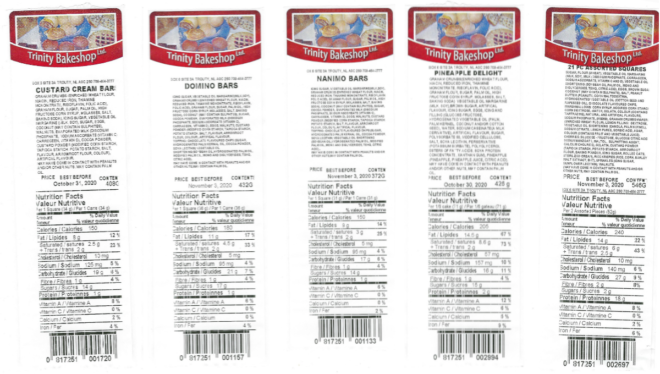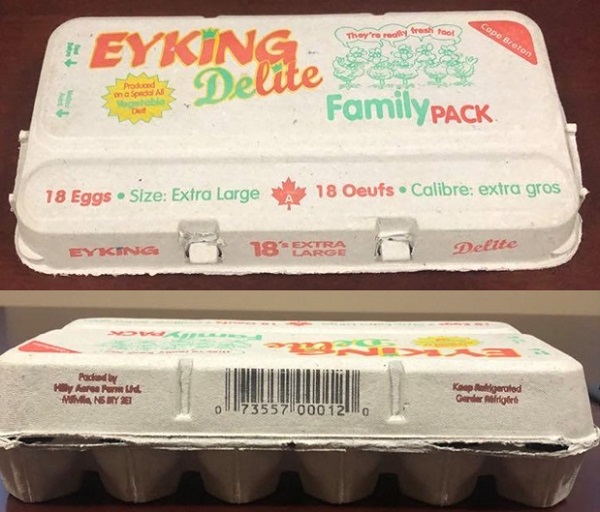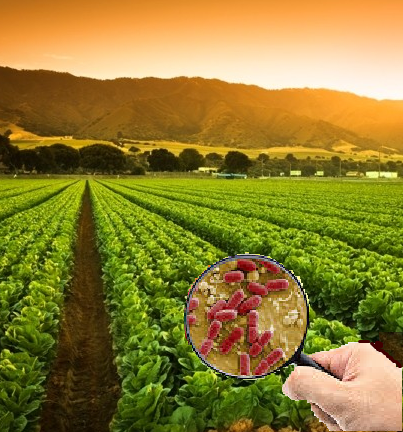The CFI announced that Trinity Bakeshop Ltd. recalled certain Trinity Bakeshop Ltd. brand bakery products from the marketplace due to possible Salmonella contamination. The recalled products include Custard Cream Bars, Domino Bars, “Nanimo” Bars, Pineapple Delight, and 21 pc Assorted Squares. Trinity Bakeshop triggered this recall. The CFIA is conducting a food safety investigation, which may lead to the recall of other products. If other high-risk products are recalled, the CFIA will notify the public through updated Food Recall Warnings. The products were distributed in Newfoundland and Labrador. There have been no reported illnesses associated with the consumption of these products.@ https://healthycanadians.gc.ca/recall-alert-rappel-avis/inspection/2020/74113r-eng.php
ruth
The food recall warning issued on October 8, 2020 has been updated to include additional product information. This additional information was identified during the Canadian Food Inspection Agency’s (CFIA) food safety investigation.
ruth
A study by Public Health England laboratories was initiated following a multi-country outbreak of listeriosis associated with sweet corn. Data on Listeria occurrence and the levels of E. coli in frozen fruit or vegetables collected at retail or at catering in the UK have not been previously available.
Between December 2018 and April 2019, 1050, frozen fruit and vegetable samples were collected. Of these, 99% were of a satisfactory or borderline microbiological quality. Eleven samples (1%) contained ≥100 cfu/g of Escherichia coli. Listeria monocytogenes or other Listeria species were detected in six samples (2%) of fruit compared to 167 samples (24%) of vegetables and six samples (26%) of fruit and vegetable mixes, but none at a level of ≥100 cfu/g. Characterization by WGS of 74 L. monocytogenes isolates identified ten genetic clusters indicating a common source. There were 78 samples (7%) from which L. monocytogenes were detected and 101 (10%) from which other Listeria species were detected. @ https://www.sciencedirect.com/science/article/pii/S0168160520303433
Frozen vegetables have previously been associated with outbreaks of listeriosis in both the USA and Europe. An outbreak of Listeria monocytogenes seroâ¦
ruth
The Canadian Food Inspection Agency (CFIA) announced that Hilly Acres Farm recalled eggs from the marketplace due to possible Salmonella contamination. The Ottawa-based company’s eggs have been sold in Newfoundland, Labrador, and Nova Scotia. The recall was triggered after Hilly Acres Farm test results found Salmonella in the product. The Canadian Food Inspection Agency (CFIA) is conducting a food safety investigation, which may lead to other products’ recall. If other high-risk products are recalled, the CFIA will notify the public through updated Food Recall Warnings. There have been no reported illnesses associated with the consumption of these products. @ https://www.inspection.gc.ca/food-recall-warnings-and-allergy-alerts/2020-10-08/eng/1602201895741/1602201901982
Hilly Acres Farm is recalling eggs from the marketplace due to possible Salmonella contamination. Consumers should not consume and distributors, retailers and food service establishments such as hotels, restaurants, cafeterias, hospitals and nursing homes should not serve, sell or use the recalled products described below.
The Packer reports that the new Canadian food safety import rule imposed on US romaine lettuce is estimated a drop of $11 million to $13 million in trade a week, and the mandate to test Salinas Valley romaine for E. coli add to costs for California shippers. Even more concerning, industry leaders say, is the precedent the testing mandate will have on future trade between the countries. The Canadian Produce Marketing Association (CPMA) is working with the authorities to mitigate the new regulations’ impact. A task force is being created to review the CFIA requirements for romaine imports from the US. The task force will also provide suggestions back to CFIA on making the procedure workable for the industry. California LGMA is hoping for a change in the rule. One of the industry concerns is that Canadian action could be a precedent that might be used for other commodities. LGMA believes that Canada’s post-harvest E. coli testing requirement hasn’t proven to be an effective way to protect consumers in the past. Currently, LGMA said that for October and November, shipments aren’t going to go to Canada. @ https://www.thepacker.com/article/canadian-romaine-requirement-could-be-costly-precedent




